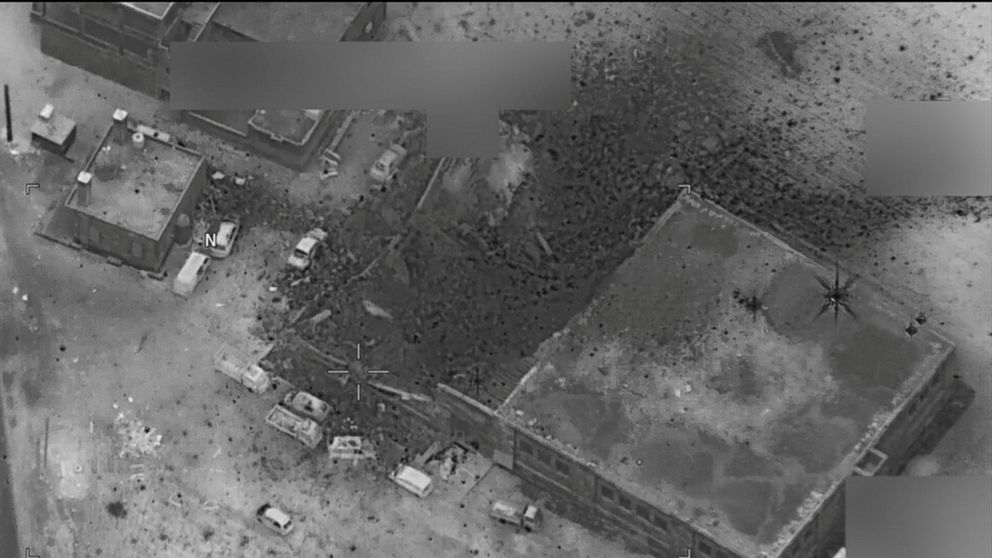US airstrikes on Syria mosque compound violated international law, UN says
"The blood was pouring and I walked away barefoot, covered in dust.”

— -- U.S. forces violated international humanitarian law when they failed to take all possible precautions to avoid civilian deaths in an attack on a mosque complex in Syria, U.N. investigators said Wednesday.
A series of U.S. airstrikes on a religious compound in the Syrian village of al-Jinah on March 16 killed 38 people, including one woman and five children, the U.N. Commission of Inquiry on Syria said in a new report, in which they also concluded that Syrian President Bashar Assad's air force conducted a sarin-gas attack that killed at least 83 civilians in April.
Three days before striking the mosque compound, the U.S. team knew about the target, but it didn’t do enough to verify it, the report said of the March 16 attack in al-Jinah.
“The Commission therefore concludes that United States forces failed to take all feasible precautions to avoid or minimize incidental loss of civilian life, injury to civilians and damage to civilian objects, in violation of international humanitarian law,” the report says.
After the attack, the U.S Central Command (CENTCOM) said that the strikes targeted al-Qaida militants gathering in a building across the street from the mosque, but eyewitnesses and monitoring groups told ABC News that the victims of the strikes were civilians gathered in a religious building. Following an investigation, CENTCOM later said they identified the building as a valid military target without fully knowing its religious nature.
When asked for comment about the U.N. report, a CENTCOM spokesman referred to the findings of its investigation on the incident that were made public in June.
In a June briefing to journalists, a CENTCOM spokesperson said that F-15 aircraft struck the building near the prayer hall with 10 bombs and that a drone fired two missiles at a target coming out from the building. One civilian, "small in stature", was killed in the attack, CENTCOM concluded.
CENTCOM acknowledged that it had failed to identify the religious nature of the buildings, but said it found that the attack was legal and appropriate as al-Qaida regional leaders were meeting in the building and two dozen of the terror group's leaders were likely to have been killed. The U.N. commission said its findings do not support the U.S. claim that an al-Qaida meeting was taking place there and the U.S. has not released evidence that such a meeting took place. It also noted that CENTCOM's investigation included interviews with "dozens of persons," none of whom were in al-Jinah at the time of the attack.
Eyewitnesses who spoke to ABC News in the days following the attack said that the targeted building was part of the mosque compound and that no militants were inside.
Ziad Mohammad Ali, a schoolteacher, was in the mosque around 6:45 p.m. local time, before the nightly prayer, on the day of the attack. He said he usually prays in the service building, which was the one that was targeted that day. After the first attack on the service building, Ali said dust and an intense smell of smoke filled the mosque that he was in, which is part of the same religious compound as the service building.
“I wanted to leave the mosque because I was afraid a new attack would hit the part of the mosque that I was in,” he told ABC News in Arabic.
When he left he saw that the wall of the building was completely destroyed and the doors had been blown away. He walked away, but then realized that worshipers were probably buried under the rubble in need of help. He decided to go back, but as he approached the damaged building, two rockets struck again.
“That’s when I was hit by shrapnel in my face and nose,” he said. “So the blood was pouring and I walked away barefoot, covered in dust.”
He said that people who were in the bathrooms of the mosque were killed in the attack, while many died outside in the second strike after fleeing the building. The next day, he asked about his friend and colleague who was at the mosque that day. He had been displaced from Aleppo, and Ali regarded him as a brother, he said.
“They told me that his decapitated body had been found with no legs,” Ali said. "That affected me a lot. He was very dear to my heart.”
He said that those killed were all civilian worshipers, mostly from al-Jinah itself or neighboring villages. Some people came from other areas for Islam lectures, but “they have nothing to do with politics,” he said, adding that he didn’t see anyone dressed in military clothes or carrying weapons.
Ahmad Qawwaf, a resident of al-Jinah and an English teacher, said he was having dinner at a friend’s house when he heard the sound of planes and then a loud explosion about five minutes before the call to nighttime prayer was set to begin on March 16. When he left, he said, he saw that the religious building affiliated with the mosque was hit.
“I saw ambulances and people covered in dust. And there were four bodies lying in the street,” Qawwaf told ABC News in Arabic via a messaging app following the attack. “The bodies were maimed ... burns on the faces and the limbs.”
In addition to those killed, the U.N. said that 26 people were wounded. Their injuries included crushed limbs, head trauma and suffocation.
ABC News' Luis Martinez contributed to this report.




